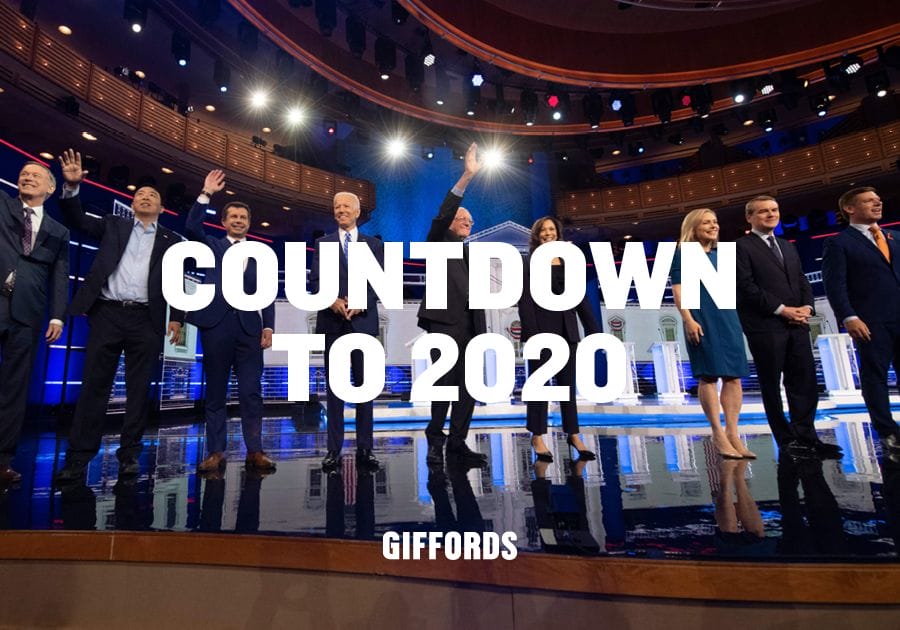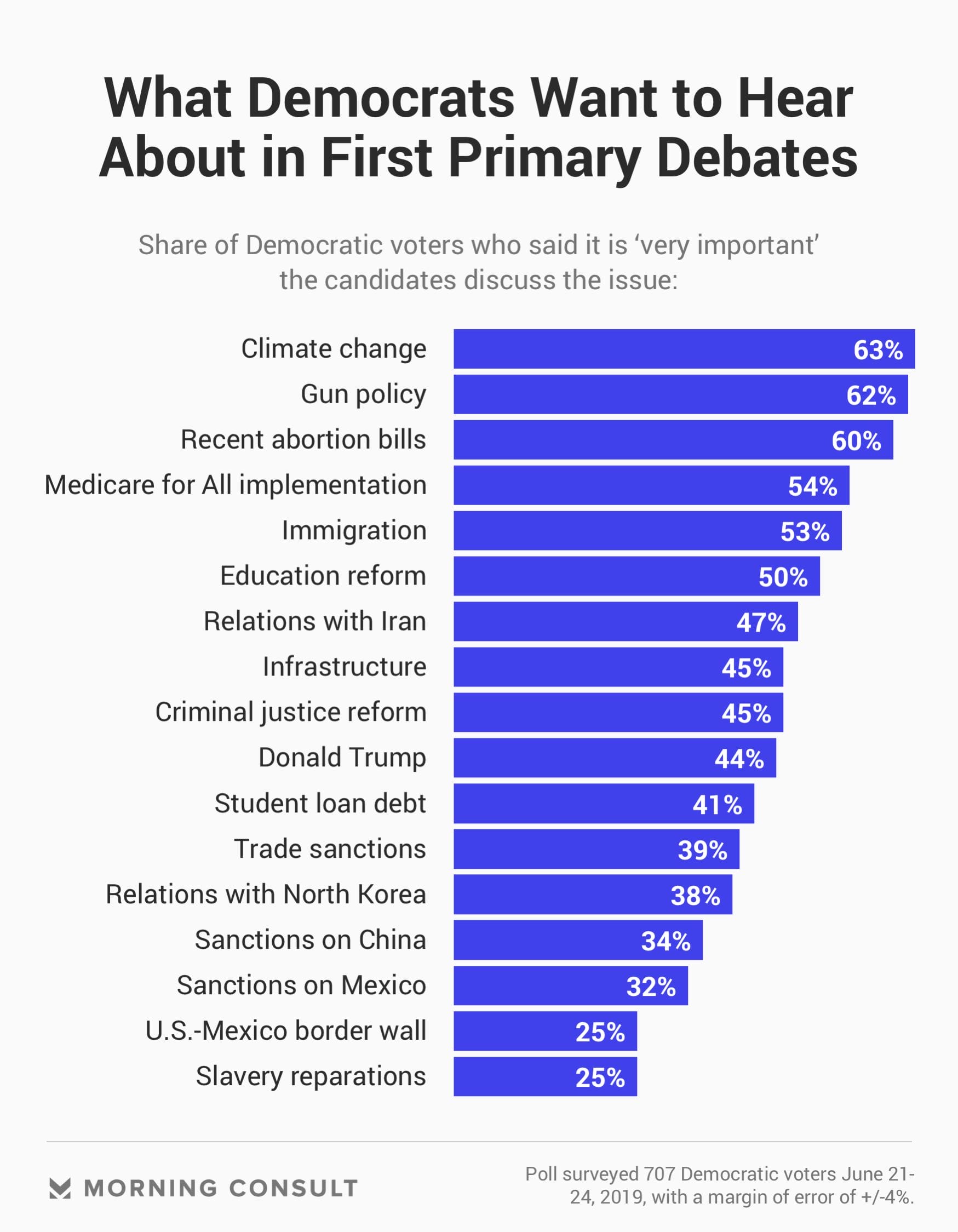
Countdown to 2020: Takeaways on Gun Violence from the First Democratic Debates
2020 Democratic Candidates Are Making Gun Violence a Leading Issue.
As the dust settles on the first round of debates for the 2020 presidential election cycle, one thing is crystal clear: gun safety is a top-tier campaign issue. Throughout the two-night affair, we heard candidates acknowledge the scope and scale of our gun violence crisis, and outline their proposals for addressing it. A number of candidates proactively brought the issue up, and pivoted back to it after the conversation had drifted away. As I think back on the past two nights of debate, here are my top takeaways.
1. No question about it: gun safety is now a kitchen table issue.
Not long ago, talking about guns was a non-starter for Democrats. Now it’s a necessity. In a recent poll, 62% of Democratic voters said it was “very important” that gun policy was discussed in the Democratic primary—a higher percentage than any other issue except for climate change. Gun safety is now an issue that unifies, rather than divides, Democrats. It expands the Democratic electorate because it helps turn out younger and other less consistent voters, and wedges many moderate voters away from the Republican party. We’ve seen countless polls over the past few years demonstrate growing public support for stronger gun laws, and candidates are taking note.

2. Gun policy took center stage like never before.
Both nights featured an entire segment of questions focused on addressing gun violence, alongside questions on other critical issues like immigration, healthcare, and climate change. Here are a few highlights from the statements candidates made about gun violence:
- Elizabeth Warren said gun violence is a national health emergency, and proposed doubling down on gun violence research.
- Cory Booker talked about regularly hearing gunshots in his neighborhood of Newark, and the importance of not letting the corporate gun lobby frame this debate.
- Julián Castro said, “In the Senate…if the decision is between 60 votes, a filibuster, or passing commonsense gun reform, I’m going to choose commonsense gun reform.”
- Tim Ryan spoke about the trauma that gun violence inflicts in our communities, particularly among our children.
- Beto O’Rourke talked about ending the sale of assault weapons and implementing extreme risk protection orders.
- Amy Klobuchar highlighted her support for the assault weapons ban as a prosecutor.
- Kamala Harris promised to take executive action to put in place universal background checks if Congress can’t get their act together in her first 100 days in office.
- Pete Buttigieg said, “If more guns made us safer, we would be the safest country on earth.”
- Kirsten Gillibrand blamed the greed of the NRA and gun manufacturers for blocking progress on our gun violence epidemic.
- Bernie Sanders talked about how assault weapons shouldn’t be on American streets.
- Eric Swalwell said, “We must be a country who loves our children more than we love our guns.”
- Joe Biden talked about the importance of smart gun technology, which prevents anyone other than authorized users from pulling the trigger.
3. Candidates actually wanted to talk about gun reform.
The pivot is a textbook component of any presidential debate—acknowledging the moderator’s question, but using your response to make a different point. Today, candidates are so eager to talk about gun safety that they pivoted to talk about gun reform proposals, rather than shying away from the issue like in years past. We saw this on the first night when Cory Booker highlighted the devastation of everyday gun violence in communities of color. And we saw it on the second night when Kirsten Gillibrand brought up gun industry liability and gun trafficking as part of answers to other questions. That’s never happened before. During the second night of the debate, when candidates were asked to name their first priority if elected president, both Kamala Harris and Eric Swalwell listed addressing gun violence.
4. Candidates recognize that gun violence isn’t just about mass shootings.
Candidates like Cory Booker used their time in the spin room post-debate to double down on his strong messaging around gun safety. Booker advocates for gun violence prevention in a nuanced way—it’s not just mass shootings and assault weapons that are fueling this epidemic. He connects school shootings to urban gun violence and has plans to address the full scope of the gun violence epidemic (read more on Cory Booker’s plan to address gun violence in this blog post). Kamala Harris also shared policies that would tackle multiple aspects of the gun violence crisis, including requiring the ATF to take the licenses of gun dealers who violate the law and banning by executive order the importation of assault weapons (here’s more on Kamala Harris’s plan to fight gun violence).
5. Democratic candidates are ready to take on the NRA.
As more and more American voters recognize that the NRA’s extremist leadership no longer represents the commonsense viewpoints of most American gun owners, the NRA’s popularity has plummeted. Members with an “A” rating from the NRA now hide their endorsement, while other members proudly wear the NRA’s “F” rating as a badge of honor. The NRA even went so far as to remove old grades from their website so they can’t be used to tarnish their champions. On the debate stage this week, Bernie Sanders touted his D- rating, and Kirsten Gillibrand directly called out the NRA’s greed. And it’s no surprise why—the NRA is mired in legal trouble and organizational chaos, and failing in its basic objectives. In 2018, Giffords and other gun safety groups outspent the NRA and helped elect a gun safety majority to the House of Representatives. The NRA no longer inspires the same fear it once did—and Democratic candidates are ready to face the NRA head on.
Parting thoughts…
I’ve been working in the gun safety movement since we founded Giffords in 2013, and never have I ever seen such a concerted emphasis on this issue in such a high-profile forum. I was really pleased to see such an early focus on gun safety. Candidates like Eric Swalwell even wore an orange ribbon in honor of Jaime Guttenburg, one of the students killed in Parkland. This level of focus and visibility on the issue is a huge sign of progress. I’m really looking forward to seeing how the rest of this election season unfolds, and most importantly, watching one of these gun safety candidates defeat Donald Trump next November.